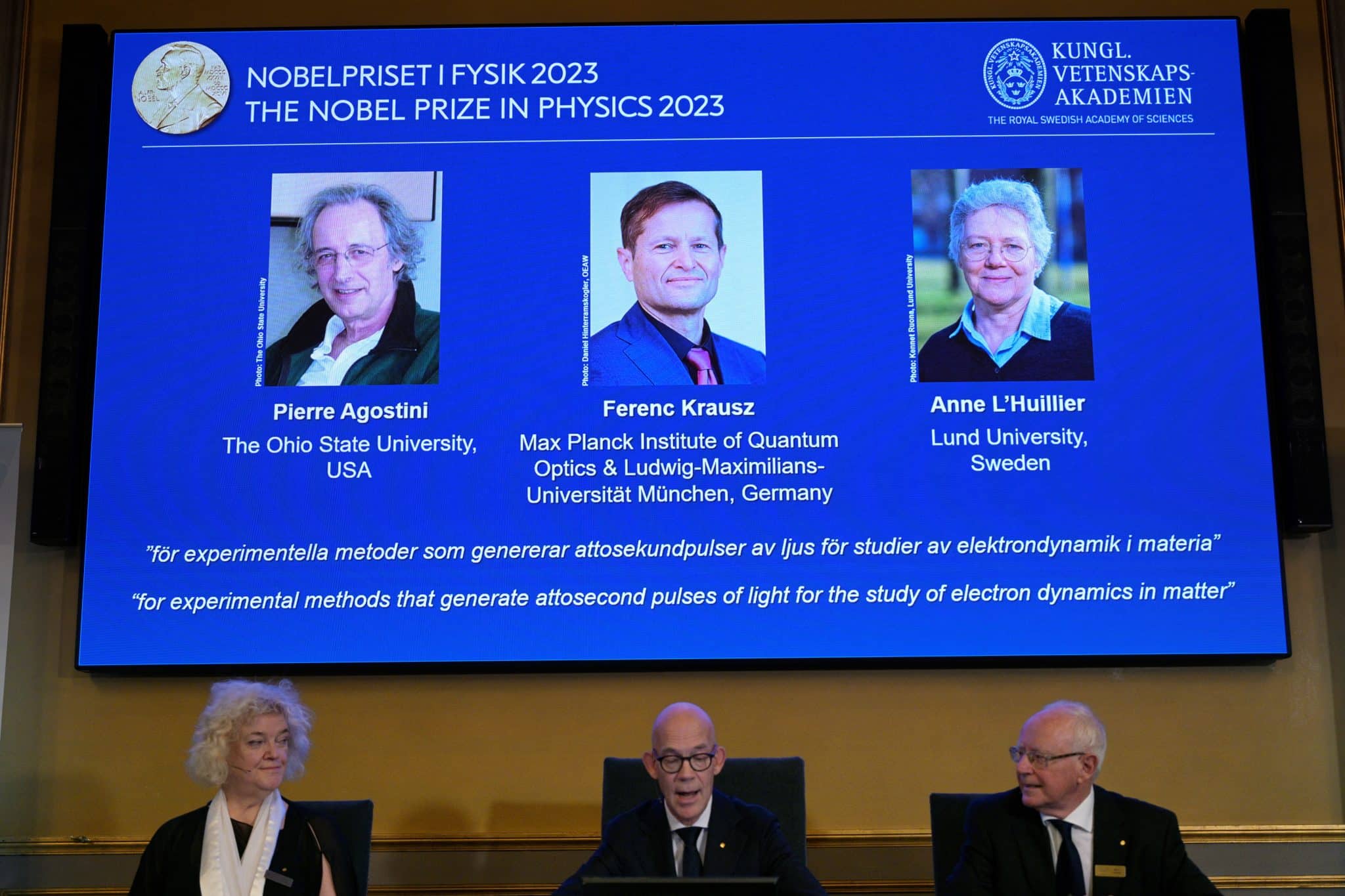Science & Environment
Revolutionizing Physics: Nobel Prize Honors Trio for Unveiling the Microcosmic Realm of Electrons

- Scientists Pierre Agostini, Ferenc Krausz, and Anne L’Huillier awarded 2023 Nobel Prize in Physics.
- Their achievement: Creating incredibly short pulses of light to observe processes inside atoms and molecules.
- Potential applications: Advancing medical diagnostics and electronics.
- Attosecond time scale: Allows exploration of electron movements within atoms in a few tenths of an attosecond.
- Prize amount raised to 11 million Swedish crowns (approx. $1 million).
- Nobel Prize awarded by the Royal Swedish Academy of Sciences.
- Eva Olsson, Nobel committee member, highlights significance of attosecond pulses in exploring the world of electrons.
- Previously, changes in electrons were considered imperceptible.
- Implications for in-vitro diagnostics: Promising technique for detecting molecular traces of diseases in blood samples.
- Scientists Agostini and L’Huillier receive congratulations from France’s Minister of Higher Education, Sylvie Retailleau.
- L’Huillier expresses elation and gratitude for the prestigious award.
- Agostini affiliated with Ohio State University; L’Huillier with Lund University, Sweden; Krausz, Hungarian-born, director at Max Planck Institute of Quantum Optics, Germany.
- Nobel Prize in Medicine also awarded this year for mRNA molecule discoveries.
- Nobel Prizes established by Alfred Nobel, honoring achievements in science, literature, and peace since 1901.
- Physics prize historically recognized groundbreaking contributions, including those of Albert Einstein.
- Previous year’s prize focused on quantum entanglement, a phenomenon Einstein referred to as “spooky action at a distance.”
In a groundbreaking achievement, scientists Pierre Agostini, Ferenc Krausz, and Anne L’Huillier have been awarded the 2023 Nobel Prize in Physics for their pioneering work in generating incredibly short pulses of light. These pulses have the extraordinary capability to capture processes occurring within atoms and molecules, potentially revolutionizing fields like medical diagnostics and electronics.
The Royal Swedish Academy of Sciences, responsible for awarding the Nobel Prize, increased the prize money this year to 11 million Swedish crowns (approximately $1 million) in recognition of the exceptional contribution made by this trio.
Eva Olsson, a member of the Nobel Prize in Physics Selection Committee, emphasized the significance of this achievement, stating, “The ability to generate attosecond pulses of light has opened the door on a tiny, extremely tiny, time scale and it’s also opened the door to the world of electrons.” Previously, changes in electrons were thought to be imperceptible, but the utilization of attosecond pulses has shattered this notion.
The time scale they have delved into, the attosecond, is so minuscule that there are as many attoseconds in one second as there have been seconds since the inception of the universe. This remarkable breakthrough grants humanity unprecedented tools for investigating the intricate movements of electrons within atoms.
This development carries profound implications for various fields. For instance, it holds promise in the realm of in-vitro diagnostics. A new technique could be employed to detect distinctive molecular markers of diseases in blood samples, potentially revolutionizing medical diagnosis.
Both Agostini and L’Huillier, originally from France but currently working in the United States and Sweden respectively, received immediate congratulations from Sylvie Retailleau, France’s minister of Higher Education, who expressed that they were a “great source of pride.”
L’Huillier, who learned of her award during a lecture, expressed her elation, stating, “It is really a prestigious prize and I’m so happy to get it. It’s incredible.” Agostini, a professor at Ohio State University, and L’Huillier, associated with Lund University in Sweden, have contributed significantly to this transformative work.
Hungarian-born Krausz, the third laureate, serves as the director at Max Planck Institute of Quantum Optics in Germany, further emphasizing the international collaboration that characterizes cutting-edge scientific research.
This accolade follows the announcement of the Nobel Prize in Medicine awarded to Hungarian scientist Katalin Kariko and U.S. colleague Drew Weissman for their pivotal contributions to the discovery of mRNA molecules, a breakthrough that laid the foundation for COVID-19 vaccines.
The Nobel Prizes, established in the will of the dynamite inventor and businessman Alfred Nobel, have been honoring achievements in science, literature, and peace since 1901. The physics prize, often spotlighting monumental scientific advancements, has recognized luminaries like Albert Einstein for their transformative contributions to our understanding of the world.
Last year’s prize in physics was awarded to Alain Aspect, John Clauser, and Anton Zeilinger for their work on quantum entanglement, a phenomenon that Einstein famously referred to as “spooky action at a distance.” This exemplifies how Nobel laureates continue to push the boundaries of our understanding of the natural world.



















































